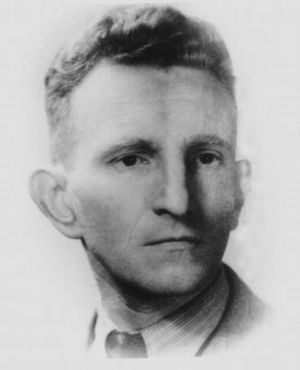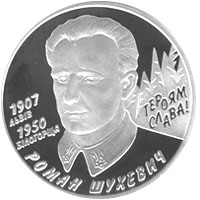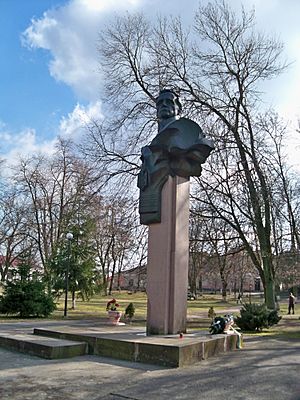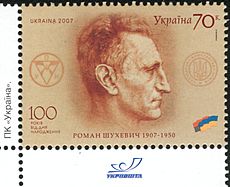Roman Shukhevych facts for kids
Quick facts for kids
Roman Shukhevych
|
|
|---|---|

Roman Shukhevych
|
|
| Nickname(s) | Taras Chuprynka |
| Born | 30 June 1907 Lemberg, Galicia, Austria-Hungary (present-day Lviv, Ukraine) |
| Died | 5 March 1950 (aged 42) Bilohorscha, Lviv, Ukrainian SSR, Soviet Union |
| Allegiance |
|
| Service/ |
|
| Years of service | 1928–1950 |
| Rank | General |
| Battles/wars |
|
| Awards | |
Roman-Taras Yosypovych Shukhevych (Ukrainian: Рома́н-Тарас Йо́сипович Шухе́вич), also known as Taras Chuprynka, was an important Ukrainian military leader. He was born on June 30, 1907, and died on March 5, 1950. He led the Ukrainian Insurgent Army (UPA).
Shukhevych was also a commander in the Nachtigall Battalion and a captain in the German Schutzmannschaft Battalion 201. In 1941, he was involved with the Nachtigall Battalion during events in Lviv that harmed the Jewish population.
He was also connected to the massacres of many Polish people in Galicia and Volhynia. It is not fully clear how much he was responsible for the killings in Volhynia. However, he did approve of them later and directed the massacres in Eastern Galicia. Some historians have been criticized for not fully explaining his role in these and other war crimes.
Contents
Early Life and Education
Shukhevych was born in Lviv, a city in a region called Galicia. His parents were active in the Ukrainian national movement of the 1800s. His family included many people who worked to improve their community in areas like politics, music, and science.
Roman went to school outside Lviv at first. Later, he returned to Lviv to study at the Lviv Academic Gymnasium. He lived with his grandfather, who studied different cultures. A military leader named Yevhen Konovalets also influenced him. Konovalets rented a room in Shukhevych's father's house when Roman was young.
Student Years and Skills
In October 1926, Shukhevych began studying civil engineering at the Lviv Politechnic Institute. He finished his engineering degree in road and bridge building in July 1934. He was known for being very athletic and won many awards.
He was also a talented musician. He and his brother Yuriy studied piano and singing. Roman sometimes sang solo at the Lviv opera. During his school years, Shukhevych was an active member of Plast, a Ukrainian Scouting group. He helped organize Plast groups.
From 1928 to 1929, Shukhevych served in the Polish army. He was sent for officer training because he was a university student. However, he was seen as untrustworthy. So, he served as a private soldier in the artillery instead.
Joining the Ukrainian Military Organization
In 1925, Shukhevych joined the Ukrainian Military Organization (UVO). This group aimed to fight for Ukrainian independence. In February 1929, the Organization of Ukrainian Nationalists (OUN) was formed. Shukhevych became a representative for the OUN.
In 1930, Shukhevych led attacks against Polish properties in Galicia. These actions were meant to make Polish authorities react strongly. This, in turn, would make Ukrainian society more determined to fight for their rights. The Polish government responded with a "pacification" campaign. This made anti-Polish feelings stronger and increased Ukrainian nationalism.
Shukhevych helped plan and took part in some actions that were called terrorist activities. Ukrainian nationalists often said these were protests against policies that were unfair to Ukrainians.
Shukhevych and other leaders like Stepan Bandera believed in a "permanent revolution." They thought that Ukrainians, who felt controlled by others, could only become free by constantly fighting their enemies. The OUN aimed to prepare for a big Ukrainian uprising. Shukhevych believed this fight had to be strong to truly defeat their opponents.
He also helped develop ideas for creating a Ukrainian army. There were two main ideas at the time. One was to form an army from Ukrainians living abroad. The other was to recruit a national army within Western Ukraine.
Time in Prison
After a Polish minister was killed in June 1934, Shukhevych was arrested. He was sent to the Bereza Kartuska Prison. In December 1935, he was found not guilty and released because there was not enough evidence against him.
He was later jailed again in Lviv for being a member of the OUN. He was sentenced to three years in prison. However, because of an amnesty in 1935, he was released after spending about two and a half years in different prisons.
After his release in 1937, Shukhevych started an advertising business called "Fama." This company secretly helped the OUN. It quickly grew across Galicia and other Polish territories. The company's workers were OUN members, often political prisoners who had just been released. "Fama" was very successful. It worked with newspapers and films, published booklets, printed posters, and even had its own transportation section.
Carpathian Ukraine's Struggle
In November 1938, a region called Carpathian Ruthenia gained some independence within Czechoslovakia. Shukhevych helped organize money and sent OUN members to set up a group called the Carpathian Sich.
In December 1938, he secretly went from Poland to the city of Khust in Ruthenia. There, with help from local OUN members and German intelligence, he set up a headquarters. This was for fighting against the central Czechoslovak government.
In January 1939, the OUN decided to try and overthrow the local government, which they felt was too pro-Czechoslovak. This attempt happened on March 13–14, when Slovakia declared independence. Shukhevych's group got weapons from the police. However, their attacks on Czechoslovak army bases failed. Soon after, Hungary invaded and took over Carpathian Ruthenia. Shukhevych was actively involved in the short fight against Hungarian forces and almost died.
After Hungary took over, Shukhevych traveled through other countries to Austria. There, he met with OUN commanders and received new orders. He was sent to Danzig to plan secret activities.
World War II and Military Roles
In August 1939, Germany and the Soviet Union signed a pact. In September, they invaded Poland, starting World War II. This created new challenges and chances for the Ukrainian nationalist movement. In late 1939, Shukhevych moved to Kraków with his family. He worked as a contact person for the Ukrainian Nationalist Command. He helped move documents and information across the Soviet-German border.
The Ukrainian nationalist leaders disagreed on how to act. So, in February 1940, the organization split into two groups: OUN-B (led by Stepan Bandera) and OUN-M (led by Andriy Melnyk). Shukhevych joined the OUN-B group. He was in charge of areas that Ukrainians claimed as their own, which had been taken by Germany.
A strong network was created to prepare for secret activities in Ukraine. Military training courses were set up to prepare future army commanders. Shukhevych also helped prepare for the Second Great Congress of the OUN in April 1941.
Nachtigall Battalion
Before Germany invaded the Soviet Union in June 1941, the OUN worked closely with Nazi Germany. OUN-B leader Stepan Bandera met with German intelligence leaders to discuss forming the "Nachtigall Battalion" and "Roland Battalion". In February 1941, Germany approved the creation of a "Ukrainian Legion" of 800 people. Shukhevych became a commander of this Legion for the OUN-B. The OUN hoped this unit would become the start of a future Ukrainian army.
In spring 1941, the legion was divided into three units. One became the Nachtigall Battalion. After training, the Nachtigall Battalion entered Lviv on June 29. There, a declaration of Ukrainian independence was announced. However, the German government did not support this declaration. Because of this, Shukhevych and the battalion were called back to Germany.
201st Schutzmannschaft Battalion
In Germany, in November 1941, the Ukrainian soldiers from the legion were reorganized into the 201st Schutzmannschaft Battalion. This unit had 650 people. They signed contracts to serve for one more year.
Shukhevych was a captain of the first company and the deputy commander of the battalion. In March 1942, the battalion went to Belarus. They served there in an area between three cities. When their one-year contracts ended, all the Ukrainian soldiers refused to continue serving. In January 1943, the battalion was sent to Lviv and then broken up. Many former members joined the OUN (B) security service. Shukhevych escaped and went into hiding.
Historian John Paul Himka notes that units like the 201st Battalion were often used to fight against resistance groups and kill Jewish people. He suggests that more study is needed on the specific actions of the 201st battalion in this regard.
Leading the Ukrainian Insurgent Army
After escaping German custody in late 1942, Shukhevych again led the military part of the OUN. In May, he became a member of the OUN's leadership. In August 1943, he was chosen as the head of the OUN and the Supreme Commander of the Ukrainian Insurgent Army (UPA).
Under Shukhevych's leadership, the UPA's goals became clearer. They fought for:
- Opposing all forms of harsh, controlling governments.
- Building a democratic state in Ukraine.
- Ensuring the right for nations to decide their own future, free from empires.
According to Lev Shankovsky, a Ukrainian historian and former UPA soldier, Shukhevych immediately ordered that the UPA should not take part in anti-Jewish actions. However, no written record of this order has been found.
The UPA was joined by people from different regions who had fought in German groups. This led to a special meeting in November 1943 for nations that were under control. They discussed a plan to fight against the forces occupying their lands.
During the German occupation, Shukhevych mostly fought in the forests. After the Soviet army took over Ukraine in August 1944, he lived in various villages in Western Ukraine. To unite all Ukrainian forces fighting for independence, Shukhevych organized a meeting of Ukrainian political parties. This led to the creation of the Ukrainian Supreme Liberation Council (UHVR).
Massacres of Poles
In spring 1943, the UPA, led by the OUN-B, began a campaign to remove the Polish population from Volhynia. In early 1944, they did the same in Eastern Galicia. This was done because they expected another conflict between Poles and Ukrainians over these lands. These territories were internationally recognized as part of Poland in 1923.
The Polish government wanted to get back its eastern borders. The OUN saw Galicia and Volhynia as Ukrainian land that should be part of a future independent Ukrainian republic.
It is estimated that up to 100,000 Poles were killed by Ukrainian nationalists during this conflict. Another 300,000 became refugees. On the other hand, killings of Ukrainians by Poles resulted in about 10,000 to 12,000 deaths. Historian Per Rudling states that Shukhevych commanded the UPA when tens of thousands of Poles were killed in 1943.
Academic Per Anders Rudling has said that some Ukrainian groups have tried to "gloss over" or downplay Shukhevych's role in the massacres of Poles and other war crimes.
Death and Legacy
Shukhevych died on March 5, 1950, during a fight with Soviet agents. These agents attacked his hiding place in a village near Lviv. His hiding place was surrounded by about 700 soldiers. Shukhevych and another person died in the shootout. Vasyl Kuk took over as the leader of the UPA after Shukhevych.
After his body was identified, it was burned, and the ashes were secretly buried. According to Soviet officers, Shukhevych's body was taken out of western Ukraine, burned, and the ashes were scattered into the Zbruch River. A stone cross was put up in 2003 to remember him there.
Family Persecution
Soviet authorities punished all members of Shukhevych's family. His brother Yuri was executed in a prison in Lviv. His mother and wife were sent away to Siberia. His father, who was disabled, was also punished and sent into exile. He died soon after arriving at prison.
His son Yuri Shukhevych and daughter Mariyka were placed in an orphanage. Yuri spent 20 years in Soviet camps. In 1972, he was sentenced to another ten years in camp and five years in exile. He lost his eyesight during this time.
Honors and Recognition

On Shukhevych's birthdays, many remembrance meetings take place in various Ukrainian cities.
In 2001, the house where Shukhevych died was turned into a memorial museum. He was played by actor Hryhoriy Hladiy in the Ukrainian film Neskorenyi (The Undefeated).
Postage stamps and coins were made in his honor for his 100th birthday. He was also given the UPA's highest awards after his death: the Gold Cross of Combat Merit First Class and the Cross of Merit in gold.
In June 2017, the Kyiv City Council renamed a street after Roman Shukhevych. This street was previously named after Nikolai Vatutin, a Soviet military commander killed by Shukhevych's UPA.
In March 2021, the city council of Ternopil named its largest stadium after Roman Shukhevych. The Lviv Oblast Council also approved renaming their largest stadium after Shukhevych and Stepan Bandera.
Hero of Ukraine Award (later removed)
Roman Shukhevych was given the title of Hero of Ukraine by President Viktor Yushchenko in October 2007. This award is given to people who have shown great bravery for Ukraine.
However, in 2010, President Viktor Yanukovych said he would try to cancel this award. Courts later ruled that the award was unlawful. They said that Shukhevych had died before Ukraine became independent in 1991. Therefore, he was not a citizen of independent Ukraine and could not receive the award.
The title was not immediately removed because of appeals. In August 2011, the Supreme Administrative Court of Ukraine finally ruled that Shukhevych's Hero of Ukraine title was illegal.
Images for kids
-
Shukhevych (left) in the Second Polish Republic in 1930
 In Spanish: Román Shujévych para niños
In Spanish: Román Shujévych para niños
 | Selma Burke |
 | Pauline Powell Burns |
 | Frederick J. Brown |
 | Robert Blackburn |







